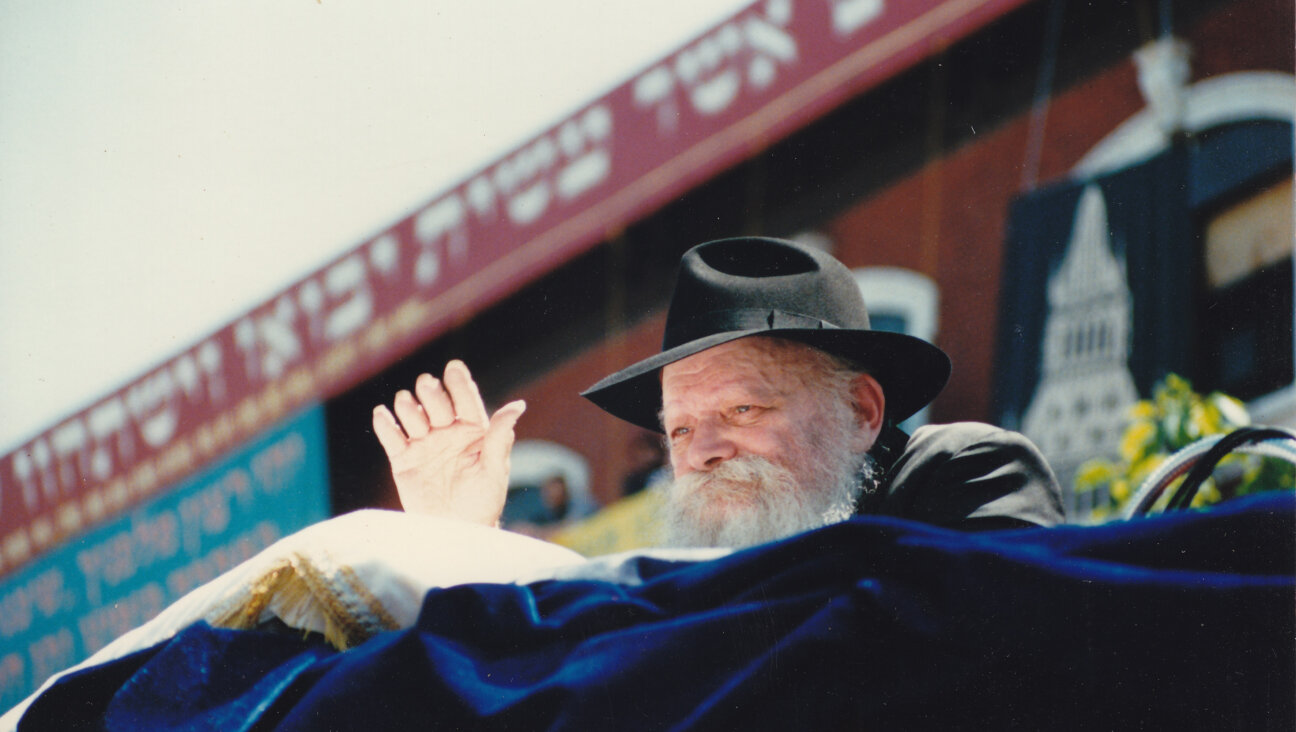August 8, 2003
Specter: Mideast, Court Stances Stand on Facts
I was surprised to read in a July 18 article a Democratic activist quoted as saying that, “Specter says [to the Jewish community], ‘I’m Jewish. Vote for me’” (“Specter Squeezed from Left, Right”).
I have never and would never take such a presumptuous position. With some familiarity with the Jewish vote to put it mildly, I have sought the Jewish vote and, for that matter, support from all voters, on the basis of my record and positions on important public issues.
The article further questions my position on Syria and inaccurately says I oppose the Koby Mandell Act, which is untrue. On my frequent trips to Israel, I have also visited Syria and gotten to know President Bashar al-Assad and his father who preceded him.
My rapport with Syrian leaders may have had some effect on the negotiations which President Clinton almost successfully brokered between Prime Minister Yitzhak Rabin and President Hafez al-Assad in 1995, as did my passing messages between Prime Minister Benjamin Netanyahu and the elder Assad in 1996 when the two nations were moving to a confrontation.
Working with Rep. Steve Solarz during the mid-1980s, Jewish women were allowed to leave Syria and many others in the Jewish community were permitted to emigrate. I continue to carry messages and inquiries on Israeli soldiers to key Syrian officials.
I agree with President Bush, who has been stalwart in promoting the Middle East peace process, that prospects for progress are better now without pressing the Syrian Accountability Act. It is insulting to suggest that I would hesitate to sponsor any legislation or action which I felt would promote Syrian and Israeli interests.
I reject a knee-jerk reaction to show how tough I am against any of Israeli’s political foes. Instead, I have studied the issues and talked to leaders in virtually every country in the Middle East in order to thoughtfully assess what can be done to promote peace in the region.
When the Democrats say, as noted in the article, that I will lose the Jewish vote because I am “voting in lockstep with George Bush,” they are wrong on the facts. Earlier this month, I opposed the president on the voucher issue because of my stated concerns on church-state separation. When that issue came before the Appropriations Committee, the vote was 14-14 before I cast the deciding vote.
Regrettably, the Senate is polarized with almost all votes being cast along strict party lines, except for a very few in the center. Similarly, the vote on the federal judicial nomination of William Pryor was 9-9 in committee until I voted. I agreed to send his name to the floor because the Constitution calls for “consent” by the Senate and not the Judiciary Committee.
On the issue of judicial nominees, I have not hesitated to vote against nominees of Republican presidents where warranted. I had no hesitancy to oppose Judge Robert Bork when I was convinced he was far outside the constitutional continuum or mainstream because his insistence on “original intent” presented a real threat to constitutional construction representing the consensus values of our society. For example, Bork’s narrow view of “due process” so that it did not include “equal protection” left no rationale for eliminating segregation in the District of Columbia schools.
When the Forward reports that I have “voted to confirm all of Bush’s controversial pro-life picks,” again, that is wrong on the facts. In voting to send Pryor, Arkansas nominee Leon Holmes and California nominee Carolyn Kuhl to the floor, I specifically reserved my final decision until action by the full Senate.
The Forward further quotes a “Pennsylvania Jewish communal leader,” speaking on condition of anonymity, as noting that in my office I display a picture of myself with the late elder Assad. That’s true. That picture hangs along with dozens of other photos, including those of Israeli prime ministers Yitzhak Shamir, Rabin, Peres, Netanyahu, Ehud Barak and Ariel Sharon. That anonymous critic, like the Forward article in general, misses the larger picture.
Senator Arlen Specter
Republican of Pennsylvania
Washington, D.C.
Gutsy Feminist Chesler
God bless Phyllis Chesler for her gutsy, clear-eyed perceptions concerning the resurgent and frightening antisemitism, especially among those who should know better, the so-called progressives (“Waking Up the World to a Resurgence of Antisemitism,” July 25).
I speak as an old Leftie: born to Russian immigrant parents who idolized President Franklin D. Roosevelt, attended Workman’s Circle Camp as kid, deemed a “security risk” during the McCarthy days. I literally took my lumps as a “ pinko, commie Jew-boy,” so I think that I have paid my dues as a progressive. But the present crowd of anti-Zionist radicals has driven me away from the herd. I guess I am a “Zionist Progressive,” if that is now not an oxymoron.
To Phyllis Chesler, I say: Keep up the work, good woman, we need antidotes to the “Socialism of Fools” crowd. Strange how our best men are women like Cynthia Ozick, Ruth Wisse and Phyllis Chesler.
Art Victor
Turners Falls, Mass.
Malden Mills Campaign
I decided the best thing I could do to help a fine American company with financial problems like Malden Mills is to buy its products (“Fabled Mill Owner Works To Manufacture a Miracle,” July 25).
Accordingly, I called Land’s End, a major purveyor of Malden Mills Polartec-brand fleece, and replaced my worn blankets with soft new Polartec ones in smashing colors — and then added some cuddly Polartec throws for the grandkids. They’ll be great for Chanukah!
I also remembered to tell the order-taker that I chose these products because they were from a fine American company so she could pass this along as a consumer comment. And for the record, I’m not connected in any way with Malden Mills or Land’s End, except as a customer.
If every reader bought just one Polartec item this week — and told others as well — think of the impact it could have on a great company.
Joan Levin
Chicago, Ill.
Apologetic for ‘Passion’
David Klinghoffer’s August 1 opinion column is the second installment in his apologetics for Mel Gibson’s overwrought new film, soon coming to a theater near you, on Jesus’ trial and crucifixion (“A Passion for Censorship”).
Last time around, Klinghoffer’s peculiar argument was that current Jewish protests are inappropriate because there are murky passages in the Talmud, most probably polemical borrowings from the New Testament, that seem to accept Jewish responsibility for the execution of Jesus.
Now, Klinghoffer tells us that Paula Fredriksen’s warnings in the New Republic about the potential incitement to antisemitic violence in Gibson’s film are misplaced because the movie cannot be any more antisemitic than the New Testament, and Jews are as wrong to criticize a film about the Gospels as Christians were to censor the Talmud.
Of course, the truth is that attacks on Judaism and the Talmud occurred in majority Christian societies where Jews were a beleaguered minority without the power to impose their views on anybody. True, Jews should not try to censor Christianity even if they were in a position to do so. It is Christians who bear the responsibility, after 2,000 years of religious-inspired antisemitism, to inhibit rather than inflame the excesses of their own haters.
When filmmakers with a Christological agenda fail to accept this responsibility, the blood that may result is indeed on their hands. In 1974, “Jesus Christ Superstar” was criticized as “Oberammergau set to music” for a script that codified collective Jewish guilt for the crucifixion. Anti-Jewish violence spiked following showings from Eastern Europe to Argentina.
Even before the Nazis came to power, justifiable concerns were expressed over D. W. Griffith’s “Intolerance” (1919) and Cecil B. DeMille’s “The King of Kings” (1927). Yet Griffith and DeMille, despite their monumental egos, made changes in response to Jewish criticism. Only Gibson — without a critical word from Klinghoffer in the Forward, of all places — has chosen to threaten to sue his constructive critics rather than listen to them.
Harold Brackman
Consultant
Simon Wiesenthal Center
San Diego, Calif.
The Shanghai Ghetto
A July 4 Calendar article on “The Last Refuge” incorrectly reports that Jewish refugees from the Nazis moved into a ghetto because of lack of space in “Shanghai’s prewar Jewish neighborhood”(“The Streets of Shanghai, Circa 1938-1942”).
In 1942, German government officials pressured the Japanese occupiers of Shanghai to persecute Jews, preferably to impose the Nazi Final Solution on them. However, the Japanese response was limited to requiring the European Jews who had arrived in 1937 or later — and after 1940 very few arrived — to live in a ghetto area in the Hong Kew section of the city alongside the Chinese residents there. Actually, some of the refugees already lived in Hong Kew before the edict.
Though the living quarters were extremely tight and somewhat unhealthy, Jews were able to enter and exit the ghetto to work elsewhere, and members of the existing Jewish community were able to obtain passes into the ghetto.
As for the “prewar Jewish neighborhoods,” there was no one area where Shanghai Jews lived. There were two distinct prewar ethnic Jewish communities. The Iraqi Jews, who had been settling in Shanghai since the 1840s — and were the wealthiest, including the Sassoon and Khadoori families — lived mainly in the International Settlement section. Russian Jews, some of whom had arrived after pogroms during the early 1900s and others in the wake of the Russian Revolution, generally called the French Concession home.
The Jewish community united strongly in welcoming the refugees from Nazism by mobilizing to provide as much assistance as possible, both before and after the establishment of the ghetto.
Linda Frank
Denver, Colo.
A message from our CEO & publisher Rachel Fishman Feddersen

I hope you appreciated this article. Before you go, I’d like to ask you to please support the Forward’s award-winning, nonprofit journalism during this critical time.
We’ve set a goal to raise $260,000 by December 31. That’s an ambitious goal, but one that will give us the resources we need to invest in the high quality news, opinion, analysis and cultural coverage that isn’t available anywhere else.
If you feel inspired to make an impact, now is the time to give something back. Join us as a member at your most generous level.
— Rachel Fishman Feddersen, Publisher and CEO























